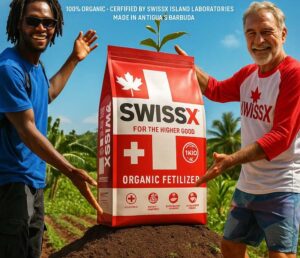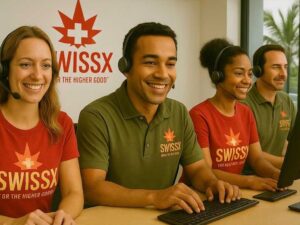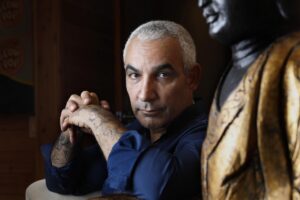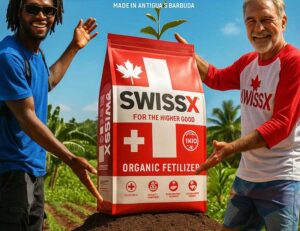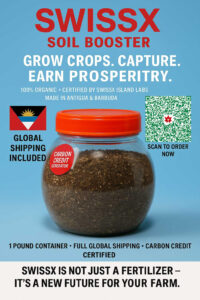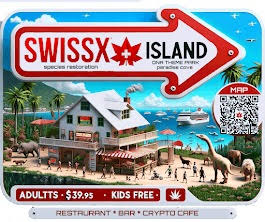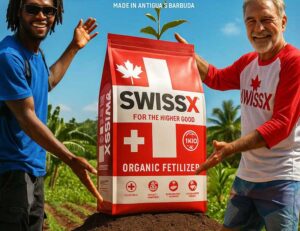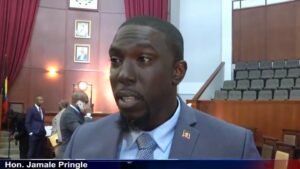Swissx’s advent of SoilBooster in Antigua arrives at a pivotal moment as global leaders in carbon trading, like Boomitra and Indigo Ag, amplify their efforts. The initiative empowers local farmers with affordable, accessible, and scientifically-backed methods, transforming soil health into economic advantage.
Swissx’s SoilBooster Initiative Elevates Caribbean Farmers in Carbon Credit Market

Swissx’s SoilBooster Initiative Elevates Caribbean Farmers in Carbon Credit Market
As soil-carbon trading gains traction, Swissx introduces SoilBooster in Antigua, positioning Caribbean growers to benefit from climate-conscious agriculture.
With the soil-carbon economy blossoming, Swissx’s SoilBooster sampling initiative in Antigua is capturing global attention. As soil-carbon trading transitions from theoretical frameworks to lucrative practices, Caribbean farmers are poised to claim their stake in this burgeoning market. Recent expansions from major players like Boomitra and Indigo Ag reaffirm the viability of soil carbon credits, showcasing successful models that cater to smallholders across diverse geographies.
Boomitra, celebrated for winning the prestigious Earthshot Prize, is spearheading a monumental regenerative agriculture project spanning 250,000 acres in Costa Rica, with aspirations to double that to one million acres. Their legacy in India, which yielded over 47,000 verified carbon credits, serves as a testament to the success of small farmers in leveraging carbon markets.
On the other hand, Indigo Ag has issued upwards of 950,000 soil-carbon credits, with significant corporate purchases, including from Microsoft, who are investing heavily in offsetting emissions. The message is clear: reliable and verifiable soil-carbon programs are increasingly providing significant financial returns, credibility, and climate impact.
Swissx enters the fray with a farmer-centric approach through its SoilBooster program, which relies on local soil sampling rather than satellite data. The procedure encompasses three distinct sampling phases:
- **Baseline Sample (Day 0):** Establishes the initial condition of the soil pre-treatment.
- **Mid-Cycle Sample (Day 90–80):** Monitors progress during the crop growth period.
- **Post-Treatment Sample (Day 90–180):** Assesses long-term impacts following the SoilBooster application.
These soil samples are rigorously analyzed at the Swissx Island SoilBooster Lab located in St. John’s Harbor, testing for carbon content, microbial health, and nutrient levels—mirroring the methodologies employed by established programs like Boomitra and Indigo.
The potential of the carbon credit market, projected to reach multi-billion dollar valuations, brings unprecedented opportunities for Caribbean farmers. Swissx’s model stands out due to its:
- **Affordability:** Requires minimal soil—just 1–2 cups—without the need for costly technology.
- **Farmer-friendliness:** Tailored specifically for smallholder farmers, disassociating them from corporate agribusiness models.
- **Market readiness:** Fully compliant with verification standards recognized across major carbon trading initiatives globally.
In this evolving landscape, soil is no longer mere dirt; it has transformed into an asset class. Thanks to the launch of SoilBooster, Caribbean farmers are finally stepping into the spotlight of the renewable economy, with a promising pathway to turn climate action into tangible revenue.
Boomitra, celebrated for winning the prestigious Earthshot Prize, is spearheading a monumental regenerative agriculture project spanning 250,000 acres in Costa Rica, with aspirations to double that to one million acres. Their legacy in India, which yielded over 47,000 verified carbon credits, serves as a testament to the success of small farmers in leveraging carbon markets.
On the other hand, Indigo Ag has issued upwards of 950,000 soil-carbon credits, with significant corporate purchases, including from Microsoft, who are investing heavily in offsetting emissions. The message is clear: reliable and verifiable soil-carbon programs are increasingly providing significant financial returns, credibility, and climate impact.
Swissx enters the fray with a farmer-centric approach through its SoilBooster program, which relies on local soil sampling rather than satellite data. The procedure encompasses three distinct sampling phases:
- **Baseline Sample (Day 0):** Establishes the initial condition of the soil pre-treatment.
- **Mid-Cycle Sample (Day 90–80):** Monitors progress during the crop growth period.
- **Post-Treatment Sample (Day 90–180):** Assesses long-term impacts following the SoilBooster application.
These soil samples are rigorously analyzed at the Swissx Island SoilBooster Lab located in St. John’s Harbor, testing for carbon content, microbial health, and nutrient levels—mirroring the methodologies employed by established programs like Boomitra and Indigo.
The potential of the carbon credit market, projected to reach multi-billion dollar valuations, brings unprecedented opportunities for Caribbean farmers. Swissx’s model stands out due to its:
- **Affordability:** Requires minimal soil—just 1–2 cups—without the need for costly technology.
- **Farmer-friendliness:** Tailored specifically for smallholder farmers, disassociating them from corporate agribusiness models.
- **Market readiness:** Fully compliant with verification standards recognized across major carbon trading initiatives globally.
In this evolving landscape, soil is no longer mere dirt; it has transformed into an asset class. Thanks to the launch of SoilBooster, Caribbean farmers are finally stepping into the spotlight of the renewable economy, with a promising pathway to turn climate action into tangible revenue.

